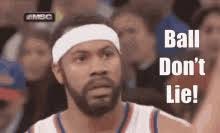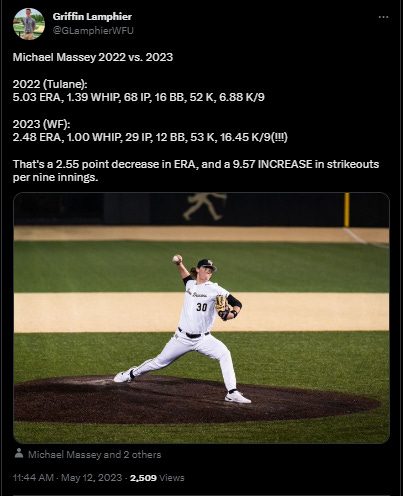Every other week I write an email discussing what I learn launching and growing Reboot Motion. If you would like to receive it directly in your inbox, subscribe below.
The following is the second post in a series on the Wake Forest Bridge Seminar, which was put on by Wake Forest Dec 17th and 18th 2022.
While nothing matches being there, I wanted to share what I learned for those who missed it, and to set the stage for an ever bigger turnout in 2023.
Building the House
At Reboot, we talk a lot about delivering tools that help coaches help athletes move better.
But without great coaches- and more importantly the great processes they create- our tools don’t matter.
That is why I was so excited to hear Corey Muscara, Mike McFerran, and Chris Lewis explain their process for finding and developing talent at Wake Forest, where they do an incredible job balancing extremes.
They take a top down approach in emphasizing a culture of competition, while understanding the importance of empowering athletes for bottom up change.
They emphasize macro concepts like curiosity and caring for teammates, but reinforce them by focusing on the micro level details.
They embrace new school tools and technology, but keep their love of old school hard work and determination.
The following is my summary of how Wake Forest’s coaching staff and analytics team builds their house:
The Foundation
“Competition is a skill, period”.
Corey started the presentation with this sentence, which is the foundation of the Wake Forest program.
Corey believes they have a dual mandate. Yes, they want to win. But they also want to instill principles for their athletes to take with them after graduation. Both mandates start with not only a competitive mindset, but having the tools and practices to execute.
One way that comes through is game management. Corey makes it very clear to his pitching staff that he will not tolerate simple mistakes, saying “If you tip pitches, if you don’t know the signs, you’re not going to pitch.”
And once these rules are made, they are non-negotiable.
I don’t know how detrimental Corey thinks a single missed sign is, but my belief is the more important factor is breeding an environment that values getting the details right…and getting them right every time.
At Reboot, we always say to “measure what matters”. For Wake, 1) competition and 2) winning on the margins matter. So they find ways to measure them.
Building
Dynamic Reports
Once the competitive foundation is laid, Wake builds on top of it…and they do so everywhere. Listen to Chris Lewis describe how the analytics teams build dynamic reports that coaches and players use to hunt for information.
At Wake, competition comes from everywhere: 1) analysts building the most flexible tools 2) coaches digging for new insights and 3) players looking to improve.
Thinking Like a Front Office
Now, with a competitive foundation- and flexible tools built on top of it- everyone else can execute.
Mike went through exactly how they act like a front office, either via traditional recruiting or the transfer portal.
Over and over, he tries to find hidden talent within a player. In other words, when analyzing an athlete he wonders if bringing them to Wake is a 1 + 1 = 3 situation?
While that high level detail is great, that alone wouldn’t be the “Wake Way”. The Wake Way is combining the broader philosophy with a focus on the details.
And for Mike, this starts with ball flight and moves backwards. If pitching is physics, the ball is the answer to the equation.
By starting with the answer, they can then ask the following questions:
Is the pitcher sequenced correctly?
Are they moving efficiently?
What are their strengths?
Once Wake knows an athlete’s relative strengths and weaknesses, they can build a plan that prioritizes both 1) keeping the strengths as strengths and 2) improving the inefficiencies.
Taking Your Vitamins
Going back to Wake’s foundation, a plan is only step one. Execution is equally as important.
Corey describes the execution of player development as “taking your vitamins”- a series of small, daily improvements that are the result of competing at every drill and every practice.
And again, they don’t believe improvements are a top down process. Rather, they educate and empower, so athletes can take control.
Mike Massey Example
Corey, Mike, and Chris end their presentation showcasing Mike Massey- a current Wake Forest pitcher who joined the university via the transfer portal.
The below clip from Mike and Corey is a bit longer than I normally present, but I think it is the perfect way to sum up how they combine competition, data, technology, and education to get results.
Results
Finally, while Corey, Mike, and Chris will never claim the house is fully built, construction seems to be going well…






